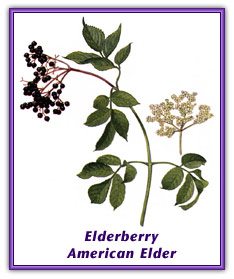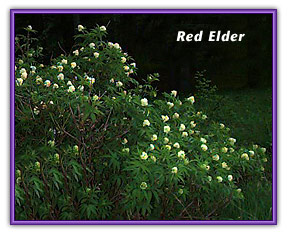 The American elder (canadensis) , also known as Elderberry, is small tree that grows to 12 feet and is native to North America. The European elder (nigra) grows to 30 feet, is found throughout Europe, Asia, North Africa, and has been naturalized in the United States. The tree has been called "the medicine chest of the common people.
The American elder (canadensis) , also known as Elderberry, is small tree that grows to 12 feet and is native to North America. The European elder (nigra) grows to 30 feet, is found throughout Europe, Asia, North Africa, and has been naturalized in the United States. The tree has been called "the medicine chest of the common people.
The flowers, leaves, berries, bark and roots have all been used in traditional folk medicine for centuries. The fruits have been used to make elderberry wine, and when cooked, can be used in pies and jams. The berries contain more vitamin C than any other herb except rosehips and black currant.
The elder also has a rich background of cultural superstitions. In the Middle Ages legends held that tree was home to witches and that cutting down one would bring on the wrath of those residing in the branches.
The Russians and the English believe that elder trees ward off evil spirits and it was considered good luck to plant a tree near your home. Sicilians think that sticks of elder wood can kill serpents and drive away thieves.
This herb has a long history dating beyond the stone ages. Egyptians discovered that applying its flowers improved the complexion and healed burns. Many early Indian tribes used elderberry, and its variants, in teas and other beverages. In the 17th century the British often drank home made wine and cordials that was thought to prolong life and cure the common cold.
 The berries from the elder contain a considerable amount of vitamins A, B and C, as well as flavonoids, sugar, tannins, carotenoids and amino acids. Warm elderberry wine is a remedy for sore throat, influenza and induces perspiration to reverse the effects of a chill. The juice from the berries is an old fashioned cure for colds, and is also said to relieve asthma and bronchitis.
The berries from the elder contain a considerable amount of vitamins A, B and C, as well as flavonoids, sugar, tannins, carotenoids and amino acids. Warm elderberry wine is a remedy for sore throat, influenza and induces perspiration to reverse the effects of a chill. The juice from the berries is an old fashioned cure for colds, and is also said to relieve asthma and bronchitis.
Infusions of the fruit are beneficial for nerve disorders, back pain, and have been used to reduce inflammation of the urinary tract and bladder. Raw berries have laxative and diuretic properties, however the seeds are toxic and may induce vomiting and nausea. Elderberries are edible when cooked.
Elder leaves contain the flavonoids rutin and quercertin, alkaloids, vitamin C and sambunigrin, a cyanogenic glucoside. Fresh elder leaves also contain hydrocyanic acid, cane sugar, invertin, betulin, free fatty acids, and a considerable quantity of potassium nitrate. Elder flowers and elder flower water have been used in a variety of ways topically and as a tonic mixture.
Elder flowers are a mild astringent and are used in skin washes to refine the complexion and help relieve eczema, acne and psoriasis. Flower water makes a soothing gargle and when strained makes an excellent eye wash.
The leaves and flowers are a common ingredient in ointments and poultices for burns and scalds, swelling, cuts and scrapes. Infusions and preparations with the blossoms combined with other herbs have also been used to quicken recovery form the common cold and flu.
Parts Used: Bark, leaves, flowers, berries.
Common Use: Topically for infections, inflammations and swelling. As a wash for skin healing and complexion purification. As a tea and cordial to sooth sore throats, speed recovery from cold and flu and relieve respiratory distress. Cooked and used in jams and conserves.
Care: Prefers sandy or loamy soil rich in humus and nitrogen. Full sun or partial shade.

![]()
![]()
![]()
 The American elder (canadensis) , also known as Elderberry, is small tree that grows to 12 feet and is native to North America. The European elder (nigra) grows to 30 feet, is found throughout Europe, Asia, North Africa, and has been naturalized in the United States. The tree has been called "the medicine chest of the common people.
The American elder (canadensis) , also known as Elderberry, is small tree that grows to 12 feet and is native to North America. The European elder (nigra) grows to 30 feet, is found throughout Europe, Asia, North Africa, and has been naturalized in the United States. The tree has been called "the medicine chest of the common people. The berries from the elder contain a considerable amount of vitamins A, B and C, as well as flavonoids, sugar, tannins, carotenoids and amino acids. Warm elderberry wine is a remedy for sore throat, influenza and induces perspiration to reverse the effects of a chill. The juice from the berries is an old fashioned cure for colds, and is also said to relieve asthma and bronchitis.
The berries from the elder contain a considerable amount of vitamins A, B and C, as well as flavonoids, sugar, tannins, carotenoids and amino acids. Warm elderberry wine is a remedy for sore throat, influenza and induces perspiration to reverse the effects of a chill. The juice from the berries is an old fashioned cure for colds, and is also said to relieve asthma and bronchitis.